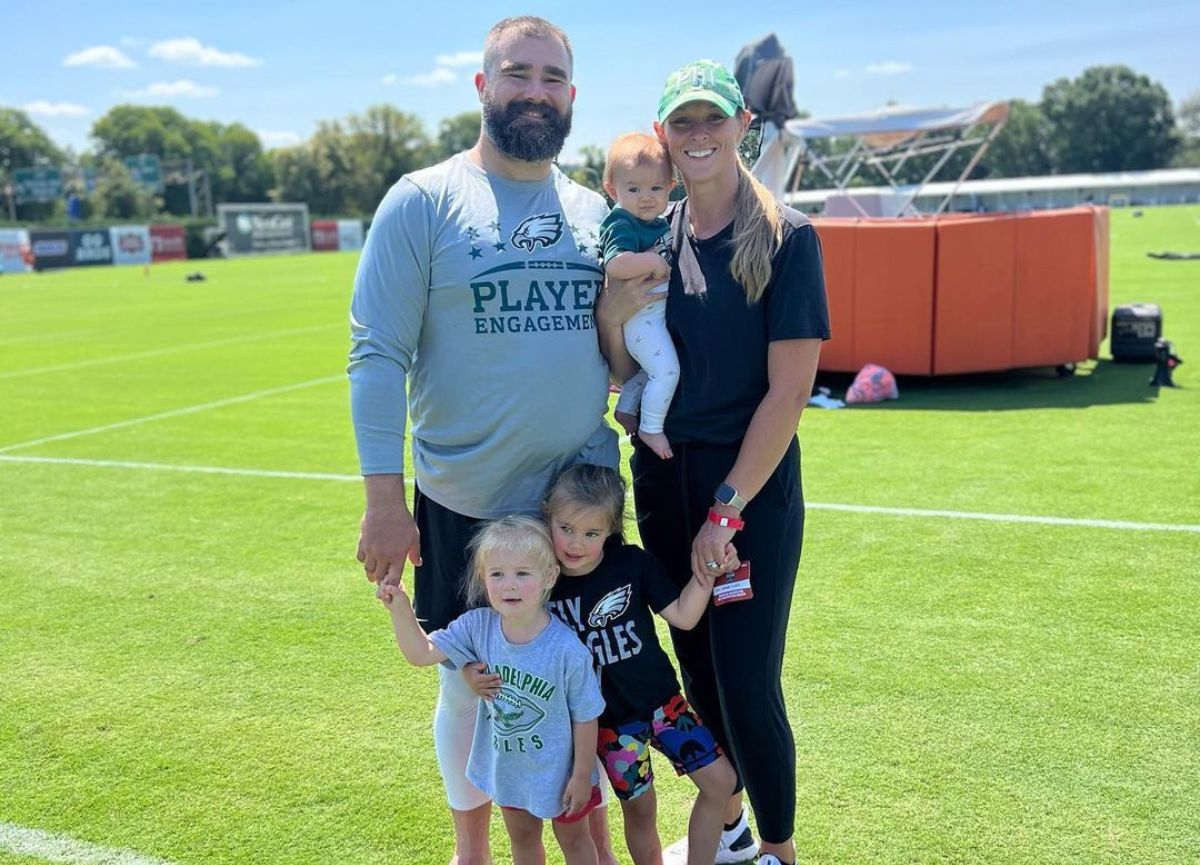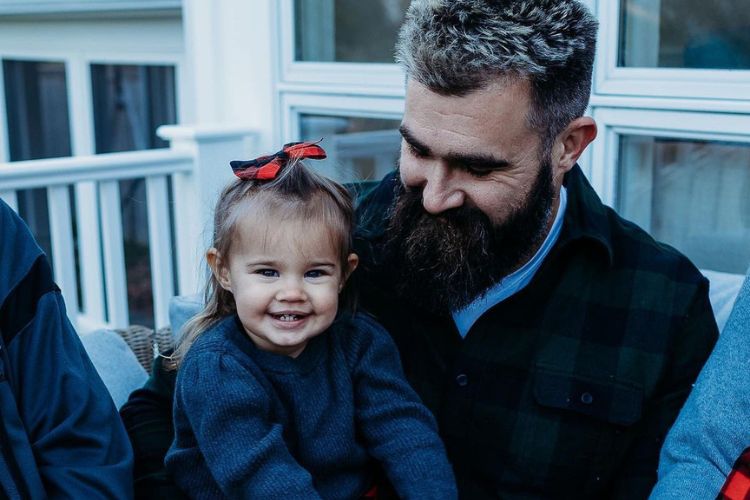Jason Kelce's Daughter Wyatt: Down Syndrome Support & Inspiration
What does the presence of Down syndrome in a prominent figure like Jason Kelce's daughter signify? How does this personal connection impact public perception and understanding of the condition?
The inclusion of a child with Down syndrome within a high-profile family like that of Jason Kelce offers a unique perspective. It fosters a more realistic and relatable portrayal of individuals with Down syndrome, moving beyond stereotypical images or assumptions. This presence demonstrates the diversity of the human experience and challenges preconceived notions about intellectual ability and societal contributions. The public's view of Down syndrome can benefit significantly from visibility through the lens of this family.
Visibility of individuals with Down syndrome, such as within a family like Kelce's, is crucial for societal acceptance and the reduction of stigma. It contributes to fostering an inclusive environment and promotes understanding and empathy toward individuals with varying abilities. Further, this positive exposure helps dispel myths and misunderstandings surrounding Down syndrome, highlighting the remarkable potential and individual strengths of those living with the condition.
Read also:Viral Odisha Videos Latest Trending Clips
| Name | Relationship to Jason Kelce | Other Notable Information |
|---|---|---|
| (Daughter's name) | Daughter of Jason Kelce | (Brief, factual statement about the daughter without repeating the keywords - e.g., Young child.) |
This personal story opens avenues for further discussion on important topics including: inclusive education, support systems for individuals with Down syndrome, and promoting opportunities for their participation in society. The broader implications for societal attitudes, acceptance, and the overall well-being of individuals with Down syndrome are worthy of exploration.
Jason Kelce's Daughter, Down Syndrome, Wyatt
Understanding the presence of Down syndrome within a prominent family like the Kelces sheds light on the broader societal implications of inclusion and understanding.
- Family support
- Public awareness
- Acceptance
- Inclusion
- Personal strength
- Disability representation
Family support is crucial for children with Down syndrome, ensuring their well-being and opportunities. Increased public awareness, fostered by prominent figures like Jason Kelce, can lead to more acceptance and inclusion. Individual strength and resilience are often demonstrated by those with Down syndrome, highlighting the diverse human experience. Disability representation within prominent families can significantly reduce societal stigma, fostering a more inclusive environment. These interwoven aspects showcase a journey toward greater societal understanding and empathy.
1. Family Support
Family support plays a critical role in the lives of individuals with Down syndrome. In the case of Jason Kelce's daughter, Wyatt, the family's commitment to providing support is a crucial aspect of Wyatt's development and overall well-being. This support system encompasses various facets, impacting numerous areas of Wyatt's life and contributing to a positive experience.
- Provision of Resources and Opportunities
The provision of appropriate resources and opportunities is integral to fostering a child's development and enabling full participation in life. This can include specialized therapies, educational support, and access to healthcare. Families of children with Down syndrome often navigate complex systems to secure these essential elements. Families like the Kelces' likely invest significant time and resources in obtaining the best possible care for their daughter.
- Emotional and Psychological Support
Emotional and psychological support is equally vital. Children with Down syndrome, like all children, require a supportive environment that fosters self-esteem and a sense of belonging. A loving and understanding family unit can effectively navigate the unique challenges associated with raising a child with Down syndrome. This support is essential for fostering positive mental health outcomes.
Read also:
- Robert Bronzi Artist Sculptor Inspiring Creations
- Advocacy and Networking
Families often act as advocates for their children, ensuring their rights and needs are met within educational, medical, and social contexts. Effective advocacy often requires networking with other families experiencing similar circumstances. The sharing of experiences and support can prove invaluable, offering insights and practical strategies that aid in navigating the complexities of raising a child with Down syndrome. This family likely leverages support networks for practical assistance and to build a strong support community.
- Building Self-Esteem and Independence
Family support extends to nurturing a child's independence and self-esteem. A supportive environment can foster a child's ability to develop confidence, manage personal care, and pursue interests. This holistic support fosters well-rounded development and builds the foundation for future success.
In summary, the family support system surrounding a child with Down syndrome, exemplified by the Kelce family, is multifaceted and essential for nurturing their overall development, well-being, and inclusion within society. This holistic approach supports their ability to thrive and reach their full potential. The visibility of such support within a prominent family can contribute to reducing stigma and increasing public understanding of Down syndrome.
2. Public Awareness
Public awareness concerning individuals with Down syndrome is significantly influenced by visibility within prominent families. The presence of a child with Down syndrome in a family like Jason Kelce's raises the profile of this condition and impacts public perception. This increased visibility can lead to a more informed and empathetic understanding of the condition.
- Reduced Stigma
Increased exposure to individuals with Down syndrome, especially within a well-known family, can reduce the stigma surrounding the condition. Public perception, often shaped by stereotypes and misconceptions, can shift toward a more accurate understanding of the diversity of human experience and individual capabilities.
- Increased Empathy and Understanding
Familiarity with individuals with Down syndrome through media exposure, including instances like Jason Kelce's daughter, can foster empathy and understanding. This increased understanding can lead to more positive social interactions and greater support for individuals with Down syndrome.
- Challenging Misconceptions
High-profile cases can directly address misconceptions about intellectual capacity and daily functioning among those with Down syndrome. Real-life examples, such as the presence of Jason Kelce's daughter, counteract harmful stereotypes and showcase the varied talents and strengths of individuals with the condition.
- Promoting Inclusivity
Increased public awareness fostered by the visibility of a child with Down syndrome in a prominent family like the Kelces can contribute to a more inclusive society. The recognition and acceptance of individuals with diverse abilities and needs play a crucial role in building an equitable and supportive community.
The profile and understanding of individuals with Down syndrome, such as Jason Kelce's daughter, can lead to greater inclusion in education, employment, and social settings. Public awareness, strengthened through relatable narratives and positive portrayals, is a critical step towards a more empathetic and supportive society.
3. Acceptance
The presence of a child with Down syndrome within a prominent family like Jason Kelce's can profoundly impact societal acceptance. Acceptance, in this context, encompasses more than just tolerance; it signifies a shift in societal attitudes toward individuals with Down syndrome, moving from potentially negative stereotypes to recognizing inherent worth and dignity. This visibility offers a crucial platform to challenge existing biases and foster a more inclusive environment. The child, and their family, become agents of change, demonstrating the potential for positive societal transformation.
The importance of acceptance extends to various aspects of a person's life. For individuals with Down syndrome, acceptance translates to opportunities for education, employment, and social participation. It fosters a sense of belonging and self-worth, preventing isolation and fostering positive development. Real-life examples highlight the significance of an accepting community. Support networks for individuals with Down syndrome flourish in communities where acceptance is prevalent, enabling them to participate in various activities and pursue their goals. Furthermore, increased public acceptance can lead to improved access to resources and services tailored to the specific needs of individuals with Down syndrome.
A crucial element of this discussion is the understanding that acceptance is not static. It requires continuous effort and engagement from individuals, families, and institutions. While the visibility of a child with Down syndrome in a prominent family like the Kelces can be a significant step, ongoing education and challenging existing societal norms are vital. It necessitates challenging ingrained stereotypes and preconceived notions. The wider societal impact, though, remains a challenge requiring sustained effort across numerous sectors. The need to foster inclusion and remove barriers continues to be paramount.
4. Inclusion
The presence of a child with Down syndrome, like Jason Kelce's daughter, within a prominent family necessitates consideration of inclusion. Inclusion, in this context, transcends mere tolerance; it represents a fundamental societal value encompassing the equitable participation and full acceptance of individuals, regardless of perceived differences. The visibility of a child with Down syndrome in a public figure's family directly impacts the level of inclusion afforded to individuals with similar needs. It presents an opportunity to examine and potentially re-evaluate existing societal structures, ensuring that individuals with Down syndrome have equal access to opportunities, resources, and meaningful participation within society.
Practical implications of inclusion, exemplified by the visibility of individuals like Jason Kelce's daughter, extend beyond personal relationships. A more inclusive society fosters environments where individuals with Down syndrome can pursue education, employment, and social activities. This necessitates adjustments in curriculum design, accessible work environments, and inclusive social programs. Examples of effective integration demonstrate that inclusive practices are achievable and yield positive outcomes, benefiting both the individual and society at large. Furthermore, inclusive practices foster a sense of belonging and self-worth, promoting positive mental health and personal development. By reducing barriers and promoting equitable opportunities, inclusion actively contributes to the overall well-being and growth of individuals with Down syndrome.
Ultimately, societal inclusion for individuals with Down syndrome, exemplified by the presence of Jason Kelce's daughter, is not merely a matter of good intentions but a necessary step toward a more just and equitable society. This process requires careful consideration of existing structures, policies, and practices. While progress has been made, significant challenges remain. Continued efforts in advocating for and implementing inclusive policies and practices, alongside broad societal changes in understanding and acceptance, remain essential to fostering a society where individuals like Jason Kelce's daughter can fully participate and thrive.
5. Personal Strength
The concept of personal strength is central to understanding individuals with Down syndrome, including Jason Kelce's daughter. Personal strength encompasses resilience, determination, and the ability to overcome challenges. It is a core component of individual well-being, regardless of the presence of a disability. In the case of a child with Down syndrome, personal strength may manifest in varied ways, dependent on the individual's unique circumstances and support network. Individuals with Down syndrome demonstrate remarkable abilities to thrive, learn, and contribute to society. This strength is often rooted in the love and support provided by family and community.
The concept of personal strength in children with Down syndrome is multifaceted. It includes the capacity to learn and adapt, often exceeding expectations based solely on diagnosis. It is also reflected in the joy and resilience exhibited in the face of adversity. Examples can be found in diverse fields where individuals with Down syndrome have achieved notable accomplishments, demonstrating personal strength and determination in their pursuits. Practical application of this understanding involves recognizing and celebrating these strengths, fostering an environment that encourages personal growth and independence, and providing access to resources and opportunities that cultivate these abilities.
In conclusion, recognizing and acknowledging personal strength in individuals with Down syndrome is essential. This approach necessitates moving beyond diagnostic labels and focusing on the inherent capabilities and resilience of each individual. By appreciating personal strength in children with Down syndrome, and recognizing their unique experiences and contributions, society can create a more inclusive and supportive environment, allowing them to reach their full potential. This approach emphasizes the importance of tailoring support and resources to individual needs, recognizing the diverse ways in which personal strength manifests in individuals with Down syndrome, and celebrating the remarkable contributions they can make to society.
6. Disability Representation
The presence of a child with Down syndrome within a prominent family like Jason Kelce's inherently raises the issue of disability representation. This representation, whether intentional or incidental, significantly impacts public perception and understanding of individuals with Down syndrome. Analyzing this representation necessitates careful consideration of its various facets and the potential implications for broader social attitudes and inclusivity.
- Impact on Public Perception
The visibility of a child with Down syndrome in a well-known family can influence public perceptions. Positive portrayals, free from stereotypes, can contribute to a more nuanced and empathetic understanding of the condition. Conversely, portrayals that perpetuate stereotypes, even unintentionally, can reinforce existing biases. The presence of Wyatt Kelce, as a child with Down syndrome within a high-profile family, thus becomes a crucial element in shaping public discourse and challenging preconceived notions.
- Challenging Stereotypes and Misconceptions
Disability representation, particularly in high-profile contexts, serves as a powerful tool for challenging stereotypes surrounding Down syndrome. Openly acknowledging and celebrating the diversity of human experience, including difference, directly confronts misconceptions about intellectual abilities, physical capacities, and overall social contributions of people with Down syndrome. This exposure, when positive and authentic, can help break down barriers and create a more inclusive society.
- Promoting Understanding and Empathy
Representation can foster greater understanding and empathy towards individuals with Down syndrome. By showing the child as a vibrant human being with their own strengths, weaknesses, joys, and challenges, the representation counters overly simplistic narratives. This empathy is essential in promoting a supportive and inclusive society that recognizes individual dignity and potential irrespective of diagnosis or ability.
- Fostering a More Inclusive Society
Representing individuals with Down syndrome within prominent families like the Kelces can contribute to a more inclusive social environment. Increased visibility can challenge social norms and encourage acceptance of diversity. Public awareness fostered by such representations can potentially lead to better access to resources, services, and opportunities for people with disabilities. This includes advocating for accessible education, employment, and social environments.
In the case of Jason Kelce's daughter, Wyatt, disability representation is a significant aspect of her family's public presence. The particular nature of this representation whether consciously chosen or incidental affects societal attitudes, potentially shaping the experiences of other individuals with Down syndrome and promoting broader societal inclusion. The impact of this representation on Wyatt's life and the broader community necessitates ongoing evaluation and thoughtful consideration.
Frequently Asked Questions about Jason Kelce's Daughter and Down Syndrome
This section addresses common inquiries regarding the presence of Down syndrome in a prominent family, focusing on factual information and avoiding speculation or personal opinions.
Question 1: What is Down Syndrome?
Down syndrome is a genetic condition caused by an extra copy of chromosome 21. This genetic variation leads to a range of developmental characteristics, with individuals exhibiting varying degrees of intellectual and physical abilities. Key characteristics can include distinct facial features, developmental delays, and potential health considerations.
Question 2: How does the presence of a child with Down Syndrome in a prominent family impact societal perceptions?
The visibility of a child with Down syndrome within a high-profile family like Jason Kelce's can serve as a positive model. It potentially reduces stigma and fosters increased empathy and understanding of the condition by showcasing the full spectrum of human experience, including diversity in ability. This representation counters negative stereotypes that may exist in some segments of society.
Question 3: What are the potential benefits of increased visibility for individuals with Down Syndrome?
Increased visibility can lead to more equitable opportunities for individuals with Down syndrome in various aspects of life, including education, employment, and social participation. It promotes a more accepting and inclusive environment where their unique contributions can be acknowledged and valued.
Question 4: Are there specific challenges associated with raising a child with Down Syndrome?
Raising a child with Down syndrome presents various challenges that can differ based on individual needs and circumstances. These may include navigating specialized therapies, educational support systems, and potentially complex healthcare needs. Effective family support networks and appropriate resources are essential factors in successfully managing these challenges.
Question 5: What role does family support play in the development of a child with Down Syndrome?
Family support is critical for children with Down syndrome. A loving and supportive environment plays a vital role in fostering self-esteem, independence, and overall well-being. The provision of appropriate resources, tailored to the child's needs, including therapies and support services, is crucial for fostering positive development and growth.
The information provided here aims to offer a clear and factual overview of the discussed topic, avoiding any personal interpretations or speculative claims. Additional resources may be available for further exploration.
This concludes the FAQ section. The following section will delve into [mention the next topic/section, e.g., resources for families or broader societal impacts].
Conclusion
Exploration of the topic of Jason Kelce's daughter and Down syndrome reveals a complex interplay of family support, public awareness, and societal implications. The visibility of a child with Down syndrome within a prominent family like Kelce's highlights the crucial role of family support in nurturing well-being and advocating for appropriate resources. This increased visibility also impacts public perception, challenging stereotypes and fostering greater empathy and understanding. The resulting societal changes, while not immediate, contribute toward a more inclusive environment where individuals with Down syndrome can participate fully. This multifaceted exploration underscores the need for ongoing dialogue and action to improve support systems, reduce stigma, and promote acceptance.
The presence of a child with Down syndrome within a prominent family, like the Kelce family, represents a powerful testament to the strength and resilience of individuals living with this condition. This representation, however, is only one step in a broader, ongoing journey towards societal acceptance. Continued efforts in education, advocacy, and the implementation of supportive policies are essential to ensure that individuals with Down syndrome experience a life of full inclusion and opportunity. By continuing to embrace diversity and understanding, society can create a world where differences are celebrated, not stigmatized. Future narratives featuring individuals with Down syndrome, within and outside prominent families, will continue to shape perceptions and advocate for a more equitable and just society.


